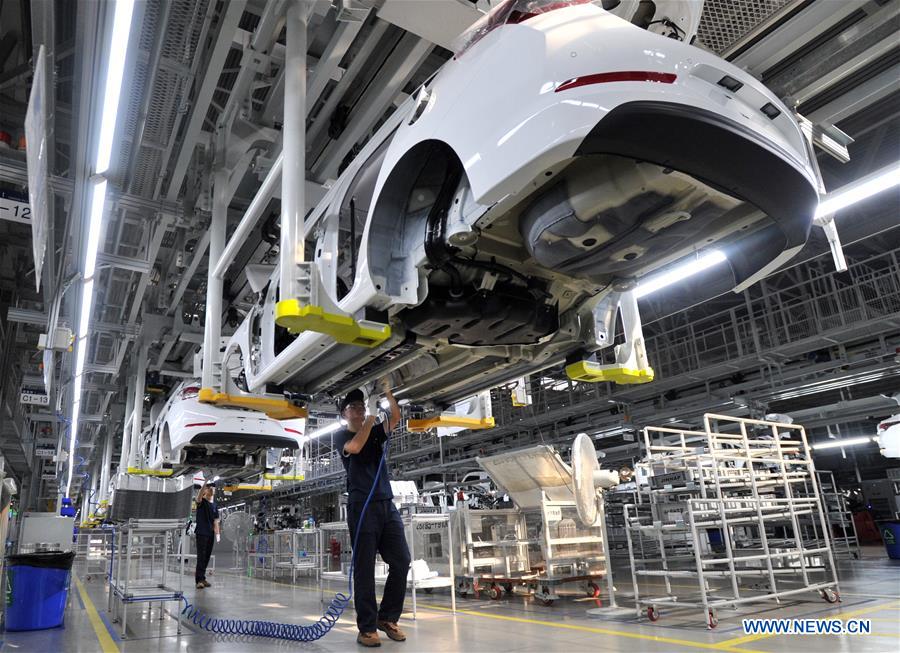
Workers work at a car general assembly line in Cangzhou, north China's Hebei Province, Sept. 12, 2017. China's economy grew 6.9 percent year on year in 2017, well above the official target of around 6.5 percent, data from the National Bureau of Statistics (NBS) showed Thursday. Gross domestic product (GDP) totaled 82.71 trillion yuan (about 12.84 trillion U.S. dollars) in 2017, with the service sector accounting for more than half of the total. (Xinhua/Mu Yu)
BEIJING, Jan. 20 (Xinhua) -- China's economic performance beat market expectations in 2017, but will the bullish momentum continue into the new year?
A moderation in GDP growth is the popular view among global investors given a high comparison base, while a more balanced and sustainable economy is expected to take shape faster.
China's economy totaled 82.7 trillion yuan (about 13 trillion U.S. dollars) in volume in 2017, expanding 6.9 percent as it picked up pace for the first time in seven years.
Stronger-than-expected growth data may indicate a further tightening of macro-prudential policy, but that does not change Japanese securities trader Nomura's economic view for China this year. It has raised its 2018 GDP growth forecast by 0.1 percentage point to 6.5 percent, with a gradual growth slowdown in coming quarters.
Global investment banks JP Morgan and UBS expect China's economy to expand about 6.7 percent and 6.4 percent this year respectively.
The property sector remains one of the major uncertainties facing China's economic growth in 2018.
No collapse or major loosening of property market management is in sight this year, but government policies including supporting rental housing and a faster-than-expected legislative progress for property tax might complicate market sentiment, according to Zhu Haibin, JP Morgan chief China economist.
UBS China economist Wang Tao estimated that property sales might lose momentum in 2018, while property investment and construction growth stay robust or soften only modestly until late this year.
Meanwhile, as the government's ongoing environmental protection and clean-up efforts kick into full swing through the peak heating season, industrial production and related investment activities should soften more visibly this quarter, Wang pointed out.
Externally, the normalization of monetary policies in developed economies might weigh upon the exchange rate and capital flow balance while more protectionist practices from the United States might dampen China's exports.
China's cross-border capital flows hit a turning point in 2017 as foreign currency reserve levels stabilized after two years of decline.
Zhu estimated that the basic equilibrium of capital flow will continue in 2018 with a stronger yuan, steady economy and improved market sentiment due to financial risk control efforts and other reforms.
Better manufacturing investment and robust external demand due to the recovering global economy may help to partly offset some upstream sector weakness, according to UBS.
Iris Pang, economist at ING, believes 2018 will be another good year for China, supported by consumption of goods and services and infrastructure investments.
ING expects manufacturing of high-tech products and parts to grow by more than 50 percent this year, cushioning the loss of production from overcapacity cuts in non-ferrous metals, shipbuilding and building materials.
Data from December and Q4 point to resilient growth momentum, which Nomura believes was driven by a robust expansion of the services sector, as it continued to benefit from China's economic rebalancing toward consumption and the Internet-led "new economy."
New growth drivers including consumption and the service sector contributed over 30 percent and 70 percent to the country's economic expansion and new jobs respectively, underscoring a steady shift in China's growth model, official data showed.
Growing new engines such as consumption will continue to lend strong steam to economic expansion in 2018 while the role of investment might further fall, Zhu noted.















